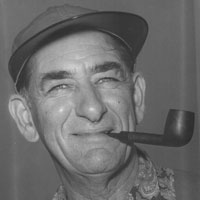Frank Woolner was a well-known authority on fishing, hunting, natural history and conservation.
Born in Worcester, Massachusetts, Frank left high school in his junior year, worked as a cook and automobile spray painter, and was New England amateur bicycle racing champion (#13) for four years, retiring undefeated to join the World War II effort. From 1942 to 1944 Woolner was chief writer for the 3rd Armored “Spearhead” Division. He also was a tank commander on the front lines and a veteran of the Normandy Invasion on June 6, 1944. After the war Sgt. Woolner remained in Germany to co-write (with Major Murray H. Fowler) the Division’s narrative history, the military classic Spearhead in the West.
Frank hadn’t done any surf fishing prior to 1942, but while overseas he received letters describing the budding activity on Cape Cod beaches. When he had his chance in 1946, both the sport and the tackle were still in their early stages of development: rods were blank Calcutta sticks with wound-on guides which didn’t work for long, and the Cuttyhunk linen line soaked up water and showered anglers with every cast. But there were beach buggies, and Frank was immediately recognizable in his first of many Model A Fords, purchased for $25 and painted dazzle (grey, green, yellow, and purple) camouflage.
When Frank became the Worcester Telegram & Gazette’s Rod and Gun Editor, he used his daily column to introduce his home town to the sport – and to the striped bass. His readers became striper-savvy and striper-obsessed in a big way, driving their 40-mph buggies 80 miles to the Cape Cod Canal, then another 60 to Provincetown, where they navigated the beaches from midnight to dawn and tide to tide. By the 1950s the sport was booming. The Worcester Striper Club was formed, and Frank helped organize the Massachusetts Beach Buggy Association in 1949. Their code of ethics covered everything from keeping beaches clean to maintaining good relations with town authorities, and in their numbered buggies (Frank in his lucky #13), members had almost unlimited beach access until the mid-1960s.
In 1950 Hal Lyman, owner and publisher of Salt Water Sportsman, was called back into the Navy, and Frank took over the magazine’s reins. Under his tutelage, what had begun in 1939 as the four-page weekly “Voice of the Coastal Sport Fisherman” became the instrument that defined marine angling and marine conservation, as Frank explored new frontiers and kept ahead of the rapidly evolving world of techniques, tackle, conservation and management. By the late 1960s the magazine’s editorials and slogans (“Limit your catch, don’t catch your limit”) began to reflect the thinking of the day, and fewer photos of excessive catches were featured. Frank, who had appeared in similar shots years before, now had a favorite phrase to describe them: “Dead fish, dumb fisherman.”
As one of the biggest names in saltwater angling, Woolner’s influence not only shaped Salt Water Sportsman but also fostered the careers of the sport’s most promising writers. He held others to the same high standard to which he held himself, and went out of his way to reassure those in whom he saw potential, often sending a letter of encouragement instead of a stark rejection slip.
Woolner was a masterful writer. He co-authored books on striped bass, weakfish, bottom fishing, saltwater tackle and techniques; authored six other titles; received numerous awards for excellence in craft; and remained on the Salt Water Sportsman masthead until his death in 1994.


1 comment:
I remember Mr. Woolner on Nauset Beach and his Model A cars in the M.B.B.A, late 50's-mid 60's. We were members, too. (#1278) He was a nice man to me, a young boy, and always talking fishing with my Dad (Howard). And yes, he usually had a pipe! My Mother frowned at that....
Roger Benson
Post a Comment